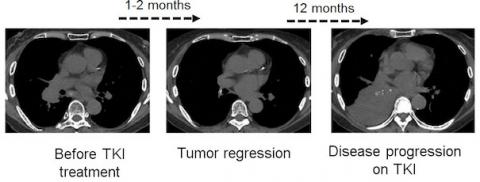Lung cancer resistance is the major obstacle to targeted therapies involving tyrosine kinase inhibitors (TKI). In Indian lung adenocarcinoma patients, activating mutations like EGFR kinase domain mutations and ALK rearrangement occurs at the rate of 23% and 5-7%, respectively. The TKIs Erlotinib and Crizotinib are the FDA approved drug of choice for patients with EGFR mutation and ALK rearrangement with response rate of 74% and 60% respectively. Numerous biological mechanisms of acquired resistance have been elucidated wherein the known genetic mechanisms accounts for 60% in EGFR mutants and 28-49% in ALK rearranged patients. However, epigenetic mechanism underlying resistance remains comparatively less explored. I aim to characterize mutational landscape of 450 epigenetic regulators by performing Whole Exome sequencing of TKI sensitive and resistant primary tumors followed by in depth targeted resequencing of these factors using cell line models established during the course of this study. Next, we will perturb the expression of candidate epigenetic regulators by performing overexpression and knockdown studies using TKI sensitive and resistant cell lines. This study would further the understanding of epigenetic mechanisms of acquired resistance in lung adenocarcinoma patients to help develop specific targeted treatments to overcome the resistance.
Figure: CT scan images of chest of EGFR mutant lung adenocarcinoma patient before and after treatment with Gefitinib. As seen in the scan, the tumor regresses after 1-2 months of gefitinib treatment. However, after 12 months, the disease progresses after initial benefit with Gefitinib treatment. [Representative image taken from internet. Source unknown.]



